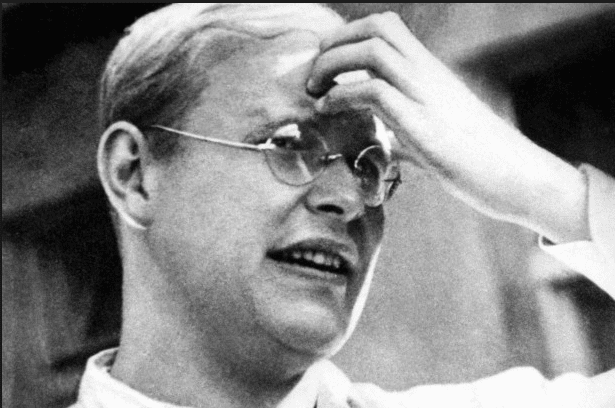 Every generation has its theological disputes. Some are much more significant than others, though some suggest that each of the debates concerns the most essential elements of the faith. Which translation to use is not as important as the Trinity but some of the voices in the former debate suggest apocalyptic doom if we get it wrong.
Every generation has its theological disputes. Some are much more significant than others, though some suggest that each of the debates concerns the most essential elements of the faith. Which translation to use is not as important as the Trinity but some of the voices in the former debate suggest apocalyptic doom if we get it wrong.
Rudolf Bultmann (see my post here) famously advanced his theories about de-mythologizing the New Testament because of the advances in science and technology, and one of his more famous lines was that one can’t believe in spirits and demons and use the radio. He saw himself stripping the NT of those mythological elements that prevented moderns from believing the more essential core of the gospel. And he pressed forward an existentialist gospel in Lutheran terms. From the decade of WWII and throughout most of his career Bultmann heard from, faced and responded back to his many critics, including many established Lutheran pastors in the Confessing Church.
Taking sides was part of the theological dispute about Bultmann.
Bonhoeffer took sides and his position can be found in Dietrich Bonhoeffer Works (English) 16. I’d like to trot out what DB said to illustrate in this post three things: first, that the Bonhoeffer many embrace is not the full Bonhoeffer (he was not only Barthian but in some ways Bultmannian) and, second, that the only way to know Bonhoeffer is to read him — not read about him in biographies. Third, it is nearly impossible not to take sides (unless one ignores an issue).
About a year ago I did a series on Mark Thiessen Nation’s book Bonhoeffer the Assassin? (here and here) in which he argues Bonhoeffer sustained his pacifism even during the war year all the way to his death. At the time I said I wanted to reconsider the so-called shift (or in Nation’s case, non-shift) in Bonhoeffer’s thinking but to do so I’d have to read Ethics again and Letters and Papers from Prison again, and along with that the correspondence in his last few years (which can be found in DBW 16). More of this at another time.
In that volume (DBW 16) I encountered his observations about the Bultmann controversy among the Confessing Church pastors. To professor-journal editor Ernst Wolf, 24 March 1942, Bonhoeffer said this:
I take great pleasure in the new Bultmann volume. The intellectual honesty of his work never ceases to impress me. Apparently Dilschneider recently disparaged you [Wolf] and Bultmann quite stupidly here at the Berlin pastors’ meeting; and, as I was told, the meeting came within a hair’s breadth of sending you a protest against Bultmann’s theology! And from Berliners, of all people! I would like to know if any of them has actually worked through the commentary on John . This arrogance, which flourishes here—under the influence of several blowhards, I think—is a real scandal for the Confessing Church.
Barth took sides, too. One of the leading opponents of Bultmann’s work was Hans Asmussen, and Barth sized it up on 12 May in a letter to Otto Salomon:
From the same letter we became aware of the repercussions of the most recent Bultmann furor. It saddened me as well; but should the “pious Hans” truly desire to burn him at the stake over this, I would most likely join the other side. Oh, if only our dear friends in the Confessing Church would leave all that and would finally begin to rack their brains, five minutes before midnight, whether there is anything, anything, they could do to deal with the inexorable coming disaster! The demythologized New Testament is truly only the dotting of an i, that is, in comparison with all that the Germans have done and daily continue to do in the occupied regions, stirring up a cloud of wrath. But I am afraid that all their eyes are still closed and behind them they are only dreaming, dreaming….
Bonhoeffer, too, took sides in these terms:
Now as to Bultmann: I belong to those who welcomed his writing— not because I agree with it. I regret the twofold approach it takes (the arguments deriving from John 1:14 and from the radio should not be mixed together; I do consider even the latter to be a valid argument, but the distinction should be clearer) —in this regard perhaps I have remained Harnack’s student to this day. To put it bluntly: Bultmann has let the cat out of the bag, not only for himself but for a great many people (the liberal cat out of the confessional bag), and in this I rejoice. He has dared to say what many repress in themselves (here I include myself) without having overcome it. He thereby has rendered a service to intellectual integrity and honesty. Many brothers oppose him with a hypocritical faith that I find deadly. Now an account must be given. I would like to speak with Bultmann about this and open myself to the fresh air that comes from him. But then the window has to be shut again. Otherwise the susceptible will too easily catch a cold.
If you see Bultmann, please give him my greetings— Tell him that I would like to see him, and how I see these things. (To Winfried Krause, 25 July 1942.)
On the 13th of September, in a letter to Ernst Wolf, he said something similar:
As I hear from Marburg, the Council of Brethren there is presently in the midst of deciding about the expulsion of Bultmann from the Confessing Church! These theological hypocrites, so works-righteous! Were it actually to come to expulsion, the matter would have to go to the Conference of Regional Councils of Brethren. If the same thing happened here, I think I would have to have myself expelled as well, not because I agree with Bultmann, but because I consider the others’ attitude by far more dangerous than Bultmann’s.










